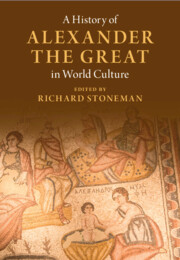Book contents
- A History of Alexander the Great in World Culture
- A History of Alexander the Great in World Culture
- Copyright page
- Contents
- Figures
- Notes on Contributors
- Preface
- Abbreviations
- 1 Introduction
- 2 Alexander and Alexandria in Life and Legend
- 3 The Image of Alexander in Ancient Art
- 4 Alexander, Philosophy and Rome
- 5 Christianising Alexander Traditions in Late Antiquity
- 6 Alexander in Ancient Jewish Literature
- 7 The Medieval Alexander
- 8 Alexander the Great and the Crusades
- 9 The Slavic Alexander
- 10 Alexander the Great in Byzantine Tradition, AD 330–1453
- 11 The Spanish Alexander
- 12 The Persian Alexander (1)
- 13 The Persian Alexander (2)
- 14 Alexander in Medieval Arab Minds
- 15 Alexander in the Age of Shakespeare
- 16 Alexander the Great in Opera
- 17 Alexander in the Long Eighteenth Century (c.1660–1830)
- 18 Images of Alexander in Germany
- 19 Alexander the Gay and the Gloryhole That Was Greece
- Index
- References
1 - Introduction
Formation and Diffusion of the Alexander Legend
Published online by Cambridge University Press: 13 January 2022
- A History of Alexander the Great in World Culture
- A History of Alexander the Great in World Culture
- Copyright page
- Contents
- Figures
- Notes on Contributors
- Preface
- Abbreviations
- 1 Introduction
- 2 Alexander and Alexandria in Life and Legend
- 3 The Image of Alexander in Ancient Art
- 4 Alexander, Philosophy and Rome
- 5 Christianising Alexander Traditions in Late Antiquity
- 6 Alexander in Ancient Jewish Literature
- 7 The Medieval Alexander
- 8 Alexander the Great and the Crusades
- 9 The Slavic Alexander
- 10 Alexander the Great in Byzantine Tradition, AD 330–1453
- 11 The Spanish Alexander
- 12 The Persian Alexander (1)
- 13 The Persian Alexander (2)
- 14 Alexander in Medieval Arab Minds
- 15 Alexander in the Age of Shakespeare
- 16 Alexander the Great in Opera
- 17 Alexander in the Long Eighteenth Century (c.1660–1830)
- 18 Images of Alexander in Germany
- 19 Alexander the Gay and the Gloryhole That Was Greece
- Index
- References
Summary
The introduction briefly surveys Alexander’s historical career before going on to describe the development of his legend in the various Greek and Latin versions of the Alexander Romance, which continued to be rewritten (as the Historia de Proeliis) to the end of the Middle Ages. It also provides the context for the contributions surveying the Jewish, Persian, Arabic, Spanish, Slavic, French and German receptions of Alexander in literature, as well as his impact as a political role model in the Crusades, Muslim expansion and the world-dominating ambitions of early modern Europe. It concludes with a glance at the contested figure of Alexander and his homeland of Macedonia, in the present-day Balkans.
Keywords
- Type
- Chapter
- Information
- A History of Alexander the Great in World Culture , pp. 1 - 13Publisher: Cambridge University PressPrint publication year: 2022
References
- 1
- Cited by

